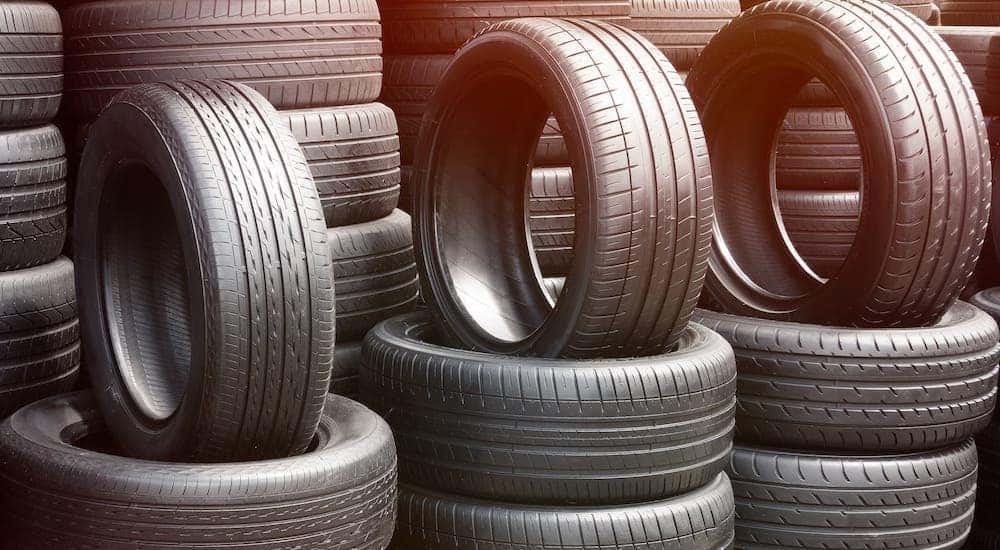The Ecological Benefits of Proper Tire Maintenance
Keeping appropriate tire treatment is commonly overlooked, yet its effect on the atmosphere is profound. Appropriate tire upkeep not only expands the life expectancy of tires yet also reduces landfill waste and adds to boosted air quality.
Minimized Fuel Consumption
Improving tire upkeep techniques can result in a substantial reduction in fuel usage for lorries. tire tracks morris il. Effectively inflated tires guarantee optimum contact with the road surface, minimizing moving resistance and improving fuel effectiveness. According to the United State Division of Power, underinflated tires can lower gas mileage by 0.2% for every single 1 psi drop in pressure in all four tires. This might feel like a tiny percentage, but when multiplied by the variety of lorries on the road, the collective effect is significant.
Along with tire pressure, regular tire rotations and alignments likewise play a crucial role in gas performance. Erratically used tires can raise gas intake as the engine functions harder to maintain speed and grip. By preserving appropriate positioning and turning tires at suggested intervals, vehicle drivers can guarantee even wear and lengthen the life of their tires, ultimately conserving gas and decreasing their carbon impact.
Extended Tire Life Expectancy
Expanding the life expectancy of tires is a crucial element of effective vehicle upkeep practices that can yield cost financial savings and environmental advantages over time. By appropriately preserving tires, drivers can significantly lengthen their functionality, decreasing the frequency at which brand-new tires require to be produced and old ones taken care of. This not only conserves important resources yet likewise decreases the energy and discharges connected with tire manufacturing and disposal processes.
Regularly inspecting tire pressure, turning tires, and ensuring correct positioning are important actions in prolonging tire life expectancy. Appropriate walk deepness is important for optimum traction and safety and security, but it likewise contributes in how much time tires can be made use of before needing replacement. Furthermore, staying clear of aggressive driving habits that speed up tire wear, such as harsh stopping and doglegs, can further improve tire longevity.
Eventually, raising the longevity of tires through aggressive maintenance not only profits the atmosphere by lowering waste and saving resources however also causes set you back financial savings for vehicle proprietors by delaying the need for new tire acquisitions.
Reduced Emissions Output
Effective tire upkeep techniques contribute to a decrease in discharges result, straightening with environmental sustainability goals in the vehicle sector. Properly inflated tires, regularly rotated and aligned, can enhance fuel efficiency, thus decreasing the overall co2 emissions from automobiles. When tires are underinflated, the engine has to function more difficult to push the car, causing boosted fuel usage and higher emissions. By maintaining optimum tire stress degrees, drivers can help reduce these unfavorable environmental impacts.
Additionally, well-kept tires also boost traction and reduce rolling resistance, further boosting fuel efficiency. This, in turn, lowers the quantity of exhaust gases launched into the atmosphere. In addition, making certain tires are correctly pumped up and aligned can extend the life-span of the tires, minimizing the frequency of tire substitutes and the associated ecological expenses of tire manufacturing and disposal.

Reduced Land Fill Waste
Provided the favorable impact of correct tire maintenance on lowering discharges result, another substantial environmental benefit is the possibility for decreased landfill waste. They put on out faster and require to be replaced much more regularly when tires are not kept correctly. This leads to a higher volume of utilized tires being dealt with in garbage dumps. By making sure that tires are properly inflated, lined up, balanced, and turned frequently, their life-span can be dramatically prolonged. This suggests that fewer tires end up in landfills, decreasing the quantity this content of non-biodegradable waste in these already overflowing websites.
Improved Air High Quality
Enhancing air high quality through correct tire maintenance methods is a vital element of lasting environmental stewardship. When tires are underinflated, they develop more rolling resistance, bring about boosted fuel usage and greater emissions of dangerous pollutants such as carbon monoxide gas and nitrogen oxides. Properly inflated tires not only enhance fuel performance however additionally minimize the amount of contaminants launched right into the air.
Furthermore, well-kept tires with appropriate tread deepness and alignment add to more secure driving conditions, lowering the likelihood of mishaps that can result in the release of additional contaminants into the ambience. By extending the lifespan of tires with routine maintenance and turning, less tires see this website are discarded prematurely, decreasing the environmental effect of tire disposal and production processes.
Conclusion
In conclusion, correct tire upkeep offers various environmental advantages. It is crucial for people to focus on tire maintenance as a straightforward yet reliable way to secure the atmosphere for future generations.
Proper tire maintenance not only expands the life expectancy of tires but additionally reduces garbage dump waste and contributes to boosted air quality - morris tire service. By preserving appropriate placement and revolving tires at recommended periods, motorists can ensure also prolong the life and put on of their tires, eventually conserving fuel and reducing their carbon impact
By appropriately maintaining tires, motorists can considerably lengthen their usability, minimizing the regularity at which new tires require to be manufactured and old ones disposed of.Frequently checking tire pressure, revolving tires, and guaranteeing correct positioning are essential steps in prolonging tire life-span. Furthermore, ensuring tires are correctly pumped up and straightened can extend the life expectancy of the tires, decreasing the regularity of tire substitutes and the linked environmental expenses of tire manufacturing and disposal.